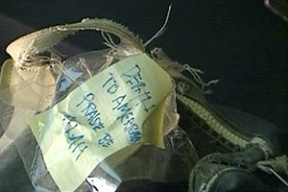The message will be edited, after complaints of an anti-Islamic bias.
Some commuters riding the Bainbridge/Seattle ferries were disturbed by a few seconds of video that played across new flat-screen monitors in the passenger seating area recently.
The snippet was part of a series of images showing suspicious baggage that ferry riders are supposed to watch for, but one image in particular caught the eye of island riders.
“The one that struck me as offensive was a taped up package that had a note that read ‘Death to America, Praise Allah’, kind of tucked up under the tape,” said Erika Biggs of Bainbridge Island.
The clip was very brief.
“You had to look at it very hard to see what it was,” Biggs said.
Islander John Chang said he had seen the clip once and had talked to other commuters who were surprised by it, and felt the message conveyed an Islamic-terrorist stereotype.
Chang found the image both inappropriate and nonsensical.
“It looked like a high school arts project,” Chang said. “Who puts a note on a bomb? I don’t think they’d even do that in James Bond movies.”
Craig Carvall, fleet training manager for Washington State Ferries, confirmed that the clip in question was part of a film called “Alert not Afraid,” which first aired aboard the ferries on Sept. 28, along with five other safety films.
The following Monday, one ferry rider lodged a complaint wish WSF about the video. Carvall called his production crew, which told him the film had been pulled the day before to have captioning work done.
“The complaint came across my desk Monday and we agreed absolutely, that shouldn’t have been in there, we need to get that out,’” Carvall said.
All the videos have since been pulled to have explanatory captions added. When they re-air, the questionable phrase in “Alert not Afraid” will be blurred out.
The films and flat screen monitors were paid for by a federal Homeland Security Administration grant secured by the Washington State Homeland Security Institute. The money is being used to educate both the public and WSF employees about ferry security and safety.
Carvall said his crew was rushing to get the films finished to meet a Sept. 30 deadline agreed to by WSF and HSI.
Because of the hurry, he said, they weren’t able to edit as carefully as they could have and the “Praise Allah” message slipped past their review.
“We were getting a lot of pressure to get these out and get them viewed,” he said. “The best we can do is say we are sorry.”
Carvall wasn’t sure if WSF was planning to issue an official explanation or apology.
Copies of the films were sent to HSI for review, but Sherrie Sibbett, who oversees the ferry grant program, wasn’t sure this week if her department had screened “Alert not Afraid.”
“All I can say at this moment in time is that (the questionable message) isn’t something we knew about and it’s certainly something HSI would not approve,” Sibbett said.
Interviewed this week, Carvall said the clip was pulled from stock footage during the production process, which is handled by Showreel Productions of Los Angeles, but that it was unclear exactly what footage it came from.
Carvall first said the clip was cut from an instructional video produced by the National Transit Institute, a transit safety information clearinghouse funded by the Federal Transit Administration.
In a second interview, Carvall said he had been mistaken and that the clip most likely came from WSF video archives. It was hard to know for sure, he said, because they had sampled hundreds of film sources to compile the videos.
“Quite honestly, we don’t know the original source of this video clip,” he said.
But one of the videos viewable on the NTI website does include a montage of suspicious looking packages, including one that fits the description given by island commuters and has the same message taped to it.
Regardless of the clip’s origin, Carvall said he was satisfied with his department’s response.
“To me what’s really important is that we messed up and we offended someone. But I dedicated staff to it immediately and fixed it,” Carvall said. “We’re going to go slower and be much more careful in the future.”
WSF has produced six different films to be aired on the ferries.
Three deal with emergency procedures like donning lifejackets and evacuation procedures and three are designed to make riders aware of suspicious activity including unattended bags or people photographing ferry functions.
Flat screen displays have only been installed in the Puyallup and Tacoma ferries so far, but WSF and HSI hope to expand the program to work on all Washington routes and possibly ferry systems in other states.
Eventually they plan to air real-time ferry updates and alerts through the video system.
“We’ll be testing it for a while and based on the customer feedback we get, I’ll be making recommendations,” Carvall said.
Chang’s feedback would be that the films – even without the controversial clip – have been more sensational than practical so far.
“There is danger out there and there are terrorists, and it’s reasonable to run educational videos,” he said. “Let’s just think about how we go about it.”


